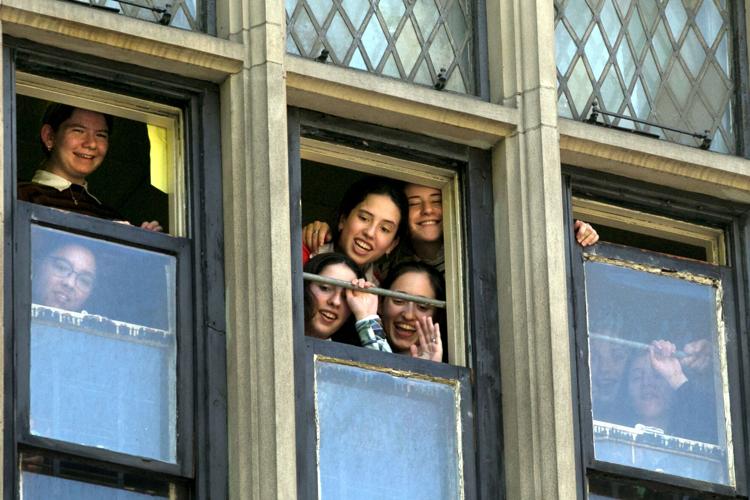New York Board of Regents outlines discussion plans for equivalency standards in private schools

Students at Manhattan High School for Girls look out of windows as U.S. Education Secretary Betsy DeVos leaves after meetings in the school, Tuesday, May 15, 2018, in New York. DeVos met with students and faculty for several hours at the orthodox Jewish private school.
(The Center Square) – New York education officials say concerns some private religious schools haven’t provided enough traditional teaching calls for more discussion and this week announced plans to hold six meetings with private- and public-school leaders in the coming months.
The state Board of Regents released a “Substantial Equivalency Update” report last month, detailing revisions to a century-old New York law mandating that private school academic instruction must be at least equivalent to what public schools teach.
A 2018 amendment to the law shifted ultimate responsibility for determining substantial equivalence to the Education Commissioner, but public response resulted in new proposed regulations.
“Given the wealth of comments and varying views expressed, the Department recommended to the Board of Regents at its February 2020 meeting that we re-engage stakeholders for feedback on the proposed amendments toward the common goal of ensuring all children receive the instruction to which they are entitled,” the report states.
MaryEllen Elia, the former state education commissioner, in 2016 began reviewing the law amid concerns some Hasidic or ultra-Orthodox yeshivas were not incorporating enough academics in their curricula.
The Orthodox Jewish community, as well as Catholic and other private school advocates, have protested the state’s intervention in what they teach. The issue remains a key concern in New York City, along with Rockland and Orange counties, which have a high number of Hasidic and ultra-Orthodox yeshivas.
Education officials have said further discussion should focus on what substantial equivalency means and how the law functions, including how much English students have to know.
In a statement published by Lohud.com, Naftuli Moster, executive director of Young Advocates for Fair Education, said state involvement is needed or thousands of children in yeshivas and private schools face another year or more without classes in English, math, science and social studies.
“Without this enforceable standard, there is no way to ensure that every child receives the education they are entitled to under the New York State Constitution,” Moster said.

